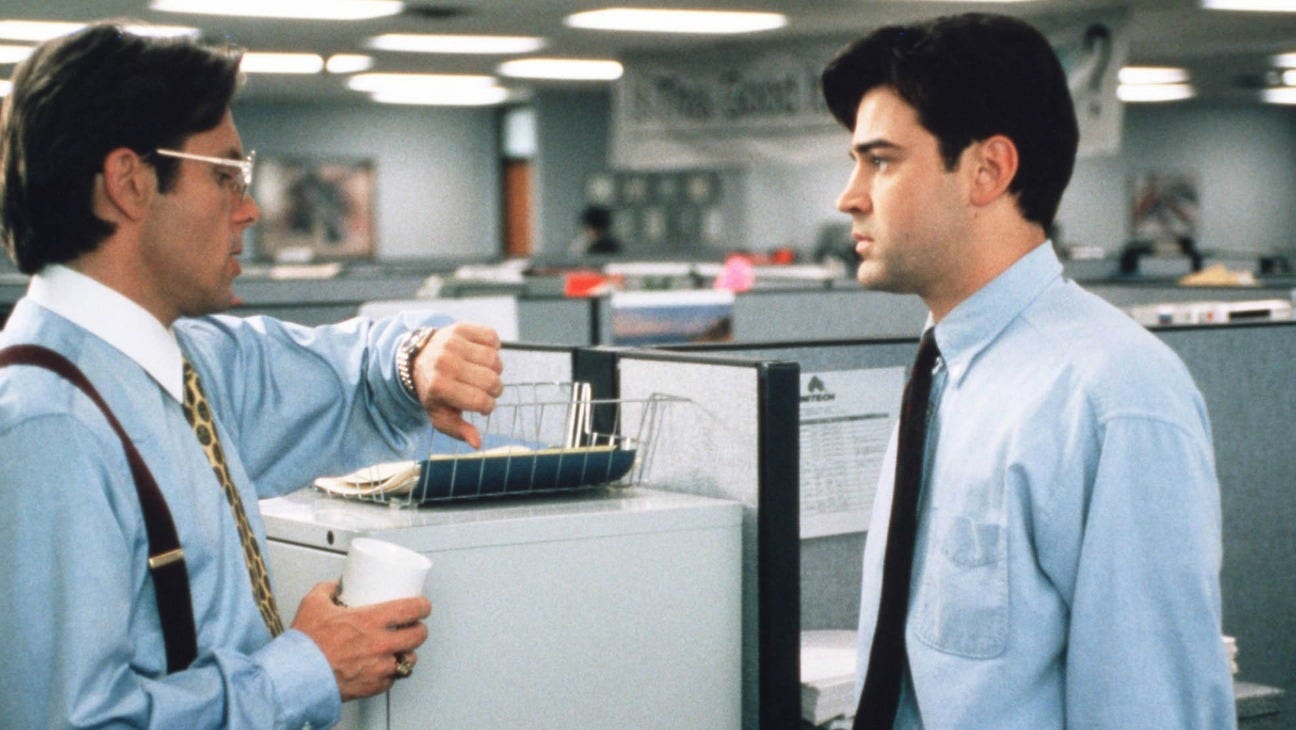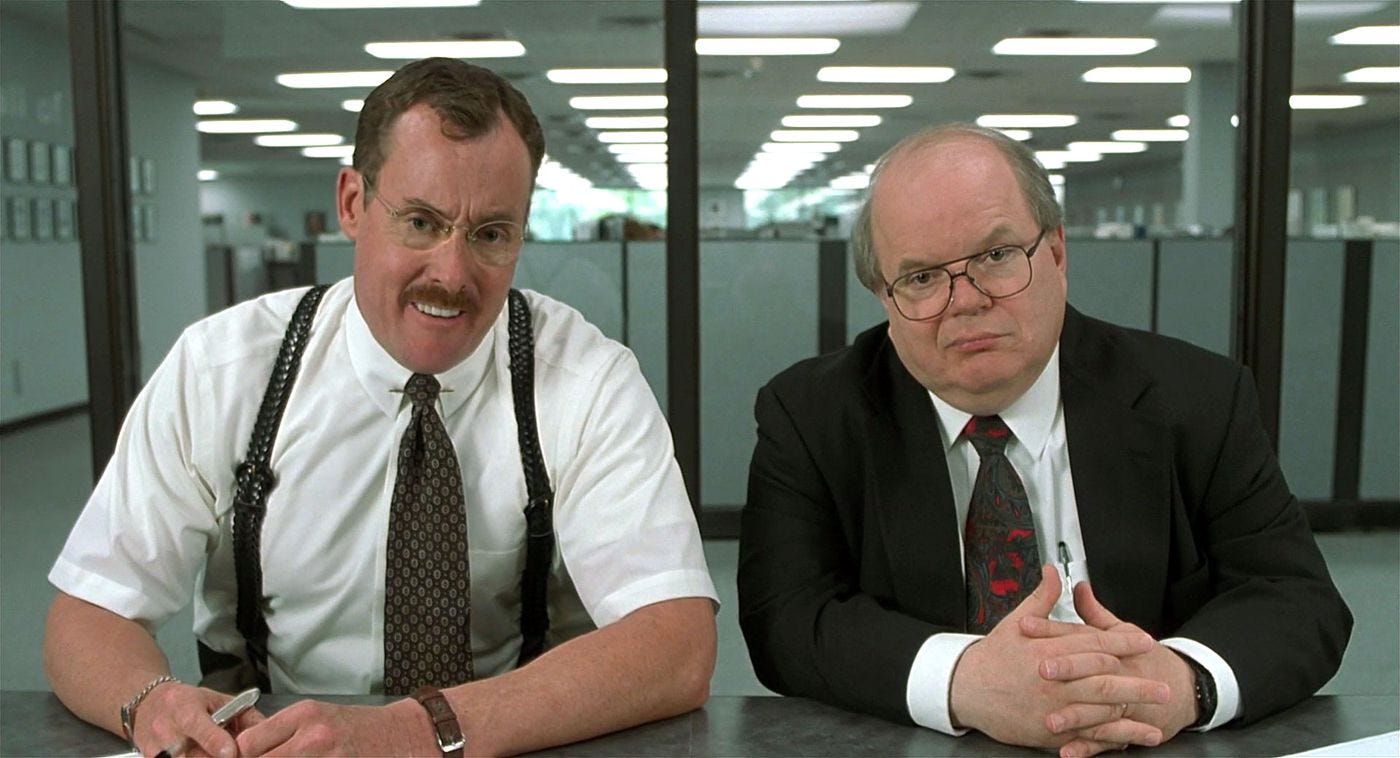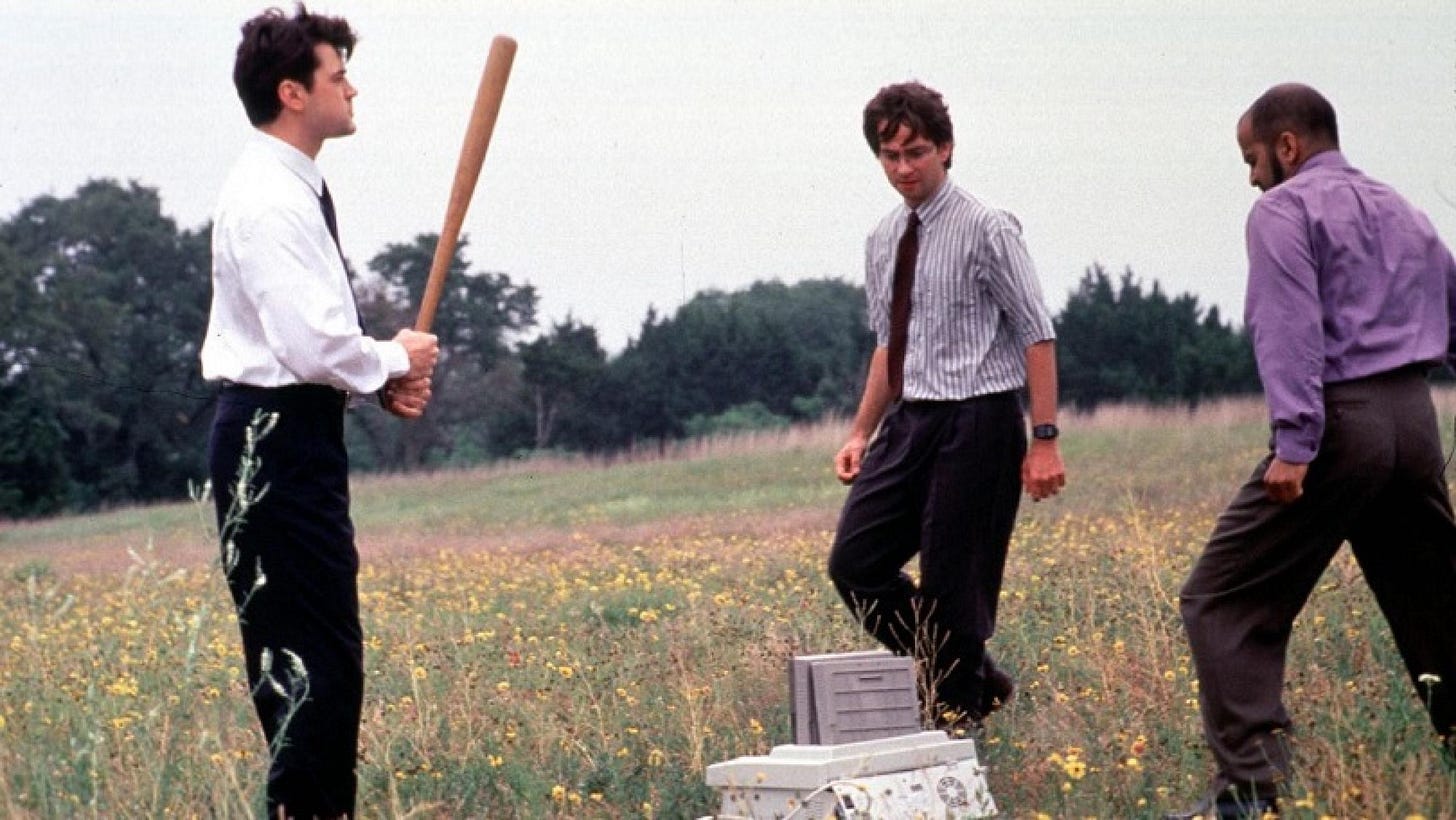Lumbergh is Your Boss Too
5 minute read
Released just one month prior to The Matrix, Office Space makes the case that a dystopia doesn’t need a dark color palette and alien overlords—gray fabric cubicles, fluorescent lights, and TPS report cover sheets are entirely sufficient. The film’s protagonist, Peter Gibbons (Ron Livingston), spends his days tediously rewriting software code to prepare for the Y2K transition. He is surrounded by coworkers that simultaneously display forced joviality and a pretense of seriousness, leading Peter into a kind of misanthropic nihilism. As he puts it at one point, every day is the new worst day of his life.
When Office Space was released in 1999, writer and director Mike Judge was most widely known for creating Beevis and Butt-Head and King of the Hill, the latter of which had only begun its run two years prior. And there is plenty of that same style of humor in Office Space, from Peter’s home at Morningwood Apartments to a software engineer named Michael Bolton who primarily listens to West Coast hip hop. But the movie also makes a genuine commentary on the nature of work in modern America that is worth considering more closely.

Through the character of Peter Gibbons, the film suggests that liberation from corporate drudgery lies in the total rejection of work itself. As Peter explains, if he was a millionaire and didn’t need to work, “I would sit on my ass all day [and] do nothing.” The arrival of two “efficiency expert” consultants—known collectively as “the Bobs” in an apparent nod to the generic role played by individual consultants regardless of context—suggests why he may believe this. Workers at Peter’s tech company, a bubble-era dot-com called “Initech,” acutely feel the ever-looming threat of layoffs. As a result, they expect to be regularly coerced into working overtime on weekends (seemingly, as salaried employees, without pay) to make up for the fact that Initech is perpetually short-staffed. Peter’s boss, Bill Lumbergh (Gary Cole), explains that the company “lost some people this week and need[s] to sort of play catch-up,” but it seems that this kind of corporate catch-up is par for the course at Initech.
Although Peter’s work environment is different from that found on a factory floor, the speed-ups associated with industrial production are still present. While factory owners resort to literally speeding up the machines in order to force their employees to work faster, this must be accomplished through other means in a modern office, many of which are present in this film. Peter is supervised by eight different bosses, which ensures that he is always under observation. The threat of layoffs creates a very real sense of job insecurity for everyone at the company, and Peter’s dependence upon his salary allows his primary supervisor, Lumbergh, to consistently attempt to extract additional unpaid work from Peter.
At the same time, however, the film makes it clear that this exploitation is not the only source of Peter’s existential dread. The corporate consultants, who are tasked with firing workers to trim labor costs, call Peter into a meeting for an evaluation and are so impressed by Peter’s candor that they decide to promote him. They determine that his performance issues are a consequence of his superiors’ low expectations and his corresponding boredom—as well as recognizing, perhaps, that his ability to evade work makes him well-suited for management. Despite the number of supervisors at Initech, Peter can usually get away with only spending, as he puts it, about fifteen minutes per week doing “real actual work.” As Peter explains to the consultants, the real source of his disdain for his work derives from a problem of motivation. “If I work my ass off and Initech ships a few extra units,” Peter points out, “I don’t see another dime!”

This is the basic quandary inherent to capitalism since its inception. Workers have little incentive to work harder since they often do not see a substantive share of the profits they helped produce. The market simply does not incentivize Peter to produce more. Still, he has no choice but to work on behalf of someone else because he has no viable alternative. He lacks access to what Karl Marx and other political economists called the “means of production,” and so Peter’s only option, his only means of securing his livelihood, is to sell his labor power to an employer for a wage.
The question, then, is how to make sense of these two seemingly contradictory truths: Peter understands that he “works” all week, but doesn’t actually do anything. And yet, Peter dreams of the day that he can quit his job so that he can spend his days “doing nothing.” Isn’t “doing nothing” exactly what Peter is already doing at work? Under capitalism, most workers regularly experience this tension, feeling the pressure to produce more alongside the sense that their work lacks meaning.
The current pandemic has made it clearer than ever that what most of us want isn’t really to do nothing; we want to do something meaningful and satisfying, which means work that benefits the people around us rather than our bosses and the owners of capital.
This has major implications in the present moment. The notion that workers are lazy and really just want to “do nothing” lies at the heart of the Right’s rejection of socialism and social welfare programs, including stimulus checks and federal supplements to unemployment benefits during the current crisis. Reactionaries argue—despite extensive evidence to the contrary—that if people’s needs were met they would not have any motivation to work. After all, who would want to punch in at the corporate matrix of Initech’s real-world equivalents and alter a few lines of code day after day? But this kind of work is precisely what “doing nothing” really looks like, and it is soul-crushing in much the same way that working for our entire lives only to produce wealth for a small privileged class is demotivating. Neither of these options can be the answer. Fortunately, they don’t have to be.




